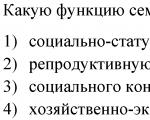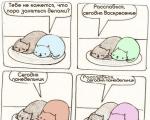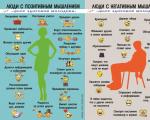Examples of phenomenal memory. Phenomenal memory - what is it, methods for developing information memorization The person with the largest memory
The 58-year-old resident of the United States is officially recognized as "a person who forgets nothing." Bob Petrella from Los Angeles remembers the dates of all the significant events in his own life, phone numbers, the content of conversations and even the scores of football matches he has seen. Scientists learned about his amazing abilities last year during a study conducted by the University of California, according to The Daily Telegraph newspaper.
Bob Petrella remembers the dates he met all his friends and almost every conversation he had over the past 53 years. For the first time, he learned about his unusual abilities while still at school: he could easily complete any test without repeating the material he had studied.
Scientists have found that a man has a phenomenally developed autobiographical memory. In total, four such people are known in the world. Experts still do not know what this is connected with and how "supermemory" works.
According to Bob Petrella, he was always aware of his giftedness, but did not want to talk about it publicly. According to him, people who learn about his talent usually believe that he suffers from savant syndrome (and it is usually associated with developmental delays) or do not believe him.
Petrella himself is accustomed to his own phenomenal memory, although he cannot explain its nature. "I remember things best when they interest me, whether it's sporting events, historical or political dates, or just days from my past."
Starting from the age of five, he remembers in detail from 25 to 50% of his days.. He remembers all his birthdays since the fifth, all the meetings of the New Year for the last forty years. Petrella has been watching the Oscars since 1971 and can name all the winners since then.
Petrella is able to name the exact day when this or that event covered in the news took place, remembers the scores of football matches of past years.
American with a phenomenal memory memorize all phone numbers his acquaintances and therefore does not use the phone book. Having once lost his mobile phone, he managed to restore the list of contacts from memory.
It is curious that the first person with a phenomenal autobiographical memory was also a resident of Los Angeles. Jill Price wrote a book about herself called The Woman Who Can't Forget.
The Center for Neuroscience and Memory Studies at the University of California studied about 2,000 people in a search for people like Bob Petrella. The doctors asked the participants of the experiment 60 questions, which could only be answered by a person who remembers the past in all its details.
Phenomenal memory is the human ability to exceptionally memorize information at high speed, and then reproduce it accurately. A person with such a memory does not need a semantic connection between the components; he can remember random numbers, dates, data. Many famous personalities were famous for their exceptional memory, but even a simple person is able to develop it by constantly doing exercises. To develop similar skills, you should understand: how memory works, what types there are, and how to train your brain.

How Memory Works
We take memory for granted, but scientists are still studying the human brain and marveling at its capabilities, including memorization.
Without the ability to remember, we would not be people, because our personality is a collection of memories and the conclusions drawn from them.
From a scientific point of view, memory is information encoded in the brain in the form of signals that are transmitted and changed between neurons. This is a complex process involving billions of neurons, each part of the brain is responsible for a certain type of memory.
The parietal cortex of the brain is responsible for musical abilities, when a person needs to play an instrument, this area is activated. The hippocampus is responsible for new memories. If it is removed, then the person will remember the past, but will not be able to remember new information, it will simply be instantly forgotten.
Memory localization has not been proven exactly, but the hypothesis that each area is responsible for a different kind of memory remains relevant.
There is a procedural memory, it is not connected with the hippocampus, so it is impossible to unlearn how to ride a bike, run, walk, swim when it is removed.
Scientists cannot say exactly how long-term memory works; the exact mechanisms for storing information and storing it have not been studied. There are only guesses and assumptions. But a memorization algorithm has been identified that works on all healthy people:
- the process of capturing information;
- preservation in the brain;
- reproduction;
- forgetting.
People tend to quickly forget information that is of no value and does not enjoy relevance. This rational use of neural networks allows us not to think about everything that we know, making it possible to focus on new knowledge.
Phenomenal memory is also not fully understood. People with this ability can extremely quickly process new information in their brain and store it, when a person with ordinary memory quickly forgets random data that is not supported by meaning, emotions, etc.
People with a phenomenal memory can look at a piece of paper with random entries of numbers, words, dates, facts and remember them by heart in a few seconds, and then voice what they saw exactly. It is amazing and opens up new frontiers of human possibilities.
Kinds
Phenomenal memory can also be of several types, like ordinary memory, depending on the area responsible for the type of memories. This means that people do not remember absolutely everything, but remember information best of all in a certain way.
The most popular variety is photographic memory. It is characterized by an accurate reproduction of the picture of what is seen, whether it is a route somewhere or the location of things in a room. A person with such a memory can easily remember, even after a long absence, what and where was, lay, was built, etc.
Phenomenal auditory memory is less common, most often it is characteristic of composers and musicians. A person with this type of memorization can easily reproduce audio information. As soon as he hears something, it is immediately stored in his brain. Such people can write down what they heard in a music notebook or immediately repeat it on their musical instrument.
There are also individuals with a mathematical memory who can easily do complex calculations in their minds and memorize these processes.
And there are those who easily reproduce information received in text form. It is enough for such people to read once and that's it. They can recite paragraphs, novels, stories, etc. by heart.

How to develop a phenomenal memory
To surprise others with instant reproduction of information, it is necessary to train memory.
Our brain has limitless possibilities if it is developed. The first step is to get into the habit of memorization exercises. Only if you practice daily for a long period, the result will be visible.
This requires sitting down and trying to reproduce the information in the brain into images:
- Colored: the more effective, the better the information will be deposited;
- Volumetric: spatial thinking is useful to consider memories from different angles;
- Large: the larger the image, the more space it will take up in the brain and be better remembered;
- Detailed: do not forget about the details and little things, they matter;
- Bright: the brighter, the easier it is to remember, dull and nondescript images are quickly lost.
In addition to the development of memory with the help of imagery, there are other techniques. Some of the most popular are associative and mnemonics.
The essence of such exercises is to find an association to anything to strengthen the semantic connection and save information in the brain. Some people try to find a pattern in numbers or associate them with the birthday of their relatives. Others associate numbers not with dates, but with images: two is a swan, five is the English S.
Mnemonics involves the development of event chains for better memorization. If a person is given random words that are in no way related to each other, then you should come up with a story that involves all subjects.
For example, given a series of words: candy, scarecrow, bottle, sock, snow. With the help of mnemonics, we come up with a series of events: the scarecrow found sweets in a bottle and poured them into a sock while it was snowing. The main goal of the technique is not only to come up with a chain of actions, but also to clearly present it.
This kind of memorization is often used in language learning applications. While learning the words, the program offers to look at the picture to create a connection with the word, and offers to read a phrase with the studied word to create an image and a bright event.
Another effective method to train the brain and develop memory is conscious reading. To do this, you just need to read regularly, take notes, and pronounce the learned information. It is important to read not for the sake of the number of pages, but for the sake of information, having time to analyze every word.

Famous personalities with a phenomenal memory
Phenomenal memory has helped many people become outstanding and go down in history.
Knowledge is power, and these people were able to memorize it and apply it competently.
- Napoleon. Historians claim that the French leader knew his military personnel by heart: in person and by name. He could also retell in detail a book he had read many years ago.
- Theodore Roosevelt. He was able to do many things at the same time and was famous for multitasking. The President of the United States read 2-4 books daily, memorizing the contents, easily retold in detail to relatives and colleagues.
- Nikola Tesla. The world-famous inventor, who gave mankind research on alternating current, was famous not only for his discoveries and deep knowledge in the field of physics and engineering. He had a photographic memory, which helps to store a huge amount of information in the brain. The researcher rarely wrote down notes, because everything was stored in the most reliable place - memory. When the lab was destroyed by fire, he recovered the data with ease thanks to his phenomenal memory.
- Alexander Alekhin. The Russian chess player, famous in the 20th century, according to contemporaries, could play simultaneously with dozens of opponents, easily switching between games, thanks to memory and fast information processing. He easily memorized combinations and moves, which gave him an advantage in the game and made him a great grandmaster.
- Sergei Rachmaninoff. He had a phenomenal auditory memory, could memorize a complex work in a few seconds and reproduce it, write it down in a music notebook. Thanks to his skills, he became an outstanding pianist, composer and conductor.
These people have made a huge contribution to the development of mankind and not without the participation of their amazing ability to quickly memorize. Phenomenal memory is not a fiction or a myth, but a real skill that can be innate or acquired if you train it regularly.
To have exceptional abilities, regular training to improve them is important.
- Spend at least 15 minutes a day on brain and memory training;
- Play chess;
- Read consciously, retell what you read aloud;
- Solve puzzles, puzzles, crossword puzzles, rebuses;
- Learn poetry or prose by heart;
- Do mathematics, do not delve into integrals and logarithms, even solving arithmetic examples has a strong effect;
- Try to constantly train your memory in life, remembering phone numbers, addresses, names, shopping lists, car numbers, random facts about people;
- Do not neglect your health and eat right;
- Go in for sports, scientists have found that this has a positive effect on intellectual abilities;
- Get enough sleep and do not overwork, give yourself a rest if you are tired;
- Don't forget to walk and breathe fresh air.
By following these tips, you can not only improve your memory, but train your brain, make yourself a more well-read and interesting person.
Guys, we put our soul into the site. Thanks for that
for discovering this beauty. Thanks for the inspiration and goosebumps.
Join us at Facebook And In contact with
We associate illness with something unpleasant and often dangerous, and for good reason. But there are also diseases that at first glance one would like to compare with superpowers.
website learned about rare diseases that not only make scientists break their heads, but also make people look like comic book characters.
1. Super memory
In addition to people who do not respond to pain, there are people who are absolutely indifferent to the cold. For example, Wim Hof is a Dutchman who baffled doctors with his ability to calmly endure very low temperatures. He survived 120 minutes in a tube of cold water and ice, climbed Mont Blanc in shorts and even swims under the ice of frozen reservoirs.
The most famous patient is the "fearless woman", American S. M. (she was given these initials to maintain anonymity). As soon as the researchers did not try to scare her: they gave poisonous spiders and snakes into their hands, showed horror films and locked her in a "haunted house" - all attempts were in vain.
Moreover, S. M. spoke about terrible situations that did not frighten her: an attack with a knife in a park at night, a case of domestic violence, after which she miraculously survived. The head of the research team found it surprising that the woman was still alive at all, because she had lost the ability to assess danger.
Human memory remains the subject of much research. To increase its information capacity, special exercises and programs have been developed. However, there are people who can already memorize large amounts of very different information. They do not need diaries and devices with a recording function: the data is stored securely in their heads for many years. We talk about eight owners of exceptional memory, which everyone can envy.
Wolfgang Amadeus Mozart
Already at the age of three, the Austrian composer memorized and reproduced on the harpsichord excerpts from plays that were performed by his father and sister. At the age of 14, in the Sistine Chapel, the boy heard a complex choral work, the notes of which were kept in strict confidence. When he got home, he wrote down the entire score from memory.
Comparison with the original showed that Mozart restored the composition with perfect accuracy. This was one of the first documented cases of a counterfeit copy of a piece of music being made. There is a hypothesis that the works of the great composer stimulate thought processes and improve memory. This phenomenon is called the Mozart effect.
Nikola Tesla

The Serbian inventor had a unique photographic memory. It was enough for him to look at the page once to permanently imprint its content in his mind. Nikola Tesla memorized entire books and reproduced complex three-dimensional images in detail. The engineer did not need reference books: he could restore any formula, equation or value from the logarithm table from memory.
The talented physicist also kept his drawings in his head. In the same place, he visualized new devices, tested them in operation, carried out modeling and modernization. In addition, Tesla was fluent in eight languages. To increase the memory capacity, he trained. It all started after the death of his brother, when little Nikola began to suffer from nightmares. To distract himself, the boy began to make mental journeys - to transfer himself to new cities and countries by the power of his imagination.
Sergei Rachmaninoff

George Grantham Bain collection/Library of Congress
The outstanding Russian composer could also boast of a unique photographic memory. For a long time, parents did not attach importance to the abilities of their son. He reluctantly sat down at the instrument, quickly and without looking at the notes played the given material, and then ran away to his friends. Later, Sergei entered the Moscow Conservatory, where legends began to circulate about his phenomenal memory.
Rachmaninoff memorized everything he heard with great speed. One day, the composer Alexander Glazunov came to his teacher's house and presented the first part of his new symphony, which he had never shown to anyone before. It is easy to imagine the author's surprise when a young student left the next room, sat down at the piano and repeated his composition by ear, jokingly passing it off as his own.
Alexander Alekhin

George Grantham Bain collection/Library of Congress
The Russian chess player Alexander Alekhine remembered all the games he played, and in 1934 he became the record holder in the blind game. Without looking at the board, he competed with 32 chess players at once and was defeated in only four games. At the same time, Alekhine memorized the moves and arrangement of the pieces on the board, calling for help from visual memory only at particularly critical moments.
He knew six languages, had an amazing memory for faces, and after one reading could recite more than a dozen pages by heart. These features led to curious situations in life. When meeting a new person, Alekhine could scare the interlocutor. For example, he remembered how four months ago he bought medicine for his six-year-old daughter Anna according to the prescription of the doctor Zasedatelev, or pointed out that his interlocutor then took out a gray crocodile skin wallet from his left pocket.
Solomon Shereshevsky

In the summer of 1962, a young journalist came to the psychologist Alexander Luria with a request to check his memory. This was advised by the editor of the newspaper in which he worked. The fact is that Solomon never wrote down and at the same time remembered with absolute accuracy all the phones, names, surnames, addresses and lists of assignments. The results of the examination surprised the psychologist so much that he devoted more than 30 years to studying the Shereshevsky phenomenon.
The man memorized thousands of incoherent words at a time, long formulas and phrases in an unfamiliar language. But forgetting was given to him with great difficulty. Shereshevsky even developed his own techniques for getting rid of unnecessary data. He perceived everything he heard synesthetically: he felt the smell, taste and color of words. They say that for this reason Shereshevsky could not read while eating - the taste of food was interrupted. He later left journalism and became a renowned mnemonist.
Kim Peak

Kathleen Turley/Globalookpress
American Kim Peak memorized up to 98% of the information. A congenital anomaly of the brain led to a multiple increase in the amount of his memory. A man could read two pages at once - with his right and left eyes. He needed 8-10 seconds for a book spread. By the age of seven, the child prodigy knew the Bible by heart, and by the age of majority he had memorized the complete works of Shakespeare.
At the same time, in everyday life, the man needed help, as he could not cope with simple household tasks on his own. In adulthood, Kim Peak mastered the piano - he played most of the pieces from memory. By the time of his death, the unique kept in his head the contents of about 12 thousand books. His abilities inspired writer Barry Morrow to create the movie Rain Man.
Marilu Henner

ALowe/Globalookpress
The American actress gained fame not only because of her roles. Physicians and physiologists are investigating her autobiographical memory. Marylou's first memories are of 18 months. She distinctly remembers playing with her brother. From that moment on, the 66-year-old woman can describe any day in great detail: what she was wearing, where she went, what programs were on TV.
This phenomenon was called hyperthymesia. To remember the events of life, Marylou does not need to make an effort. Its memory works like a video recorder, allowing you to rewind and play any fragment. Thanks to this phenomenon, Henner remembers thousands of human faces. According to the actress, she perceives her peculiarity as a gift and has never experienced inconvenience.
Jill Price

Dan Tuffs/Getty Images
But another owner of the same abilities admits that hyperthymesia exhausts her. Jill Price was the first to be diagnosed with a surprising syndrome. In 2000, she wrote a letter to a doctor at the University of California, Irvine. The woman said that she remembers in detail every day since 1976. Any date she hears takes her back to that time, forcing her to relive the past again and again.
According to Jill, this happens endlessly and out of control. In addition, all the bad memories in her head remain as vivid and distinct as they were many years ago. In 2008, Price wrote her autobiographical book, Woman Unable to Forget. Due to the increased interest in research in this area, hyperthymesia has been confirmed in several more people.



